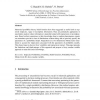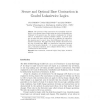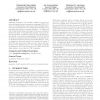116 search results - page 19 / 24 » On revising fuzzy belief bases |
TFS
2008
13 years 7 months ago
2008
Abstract--This study proposes an efficient self-evolving evolutionary learning algorithm (SEELA) for neurofuzzy inference systems (NFISs). The major feature of the proposed SEELA i...
FSS
2008
13 years 7 months ago
2008
Numerical possibility theory, belief function have been suggested as useful tools to represent imprecise, vague or incomplete information. They are particularly appropriate in unc...
EUSFLAT
2003
13 years 9 months ago
2003
We revise the classic methodology to find the multi-product break-even point. In the current paper we propose a solution to the problem under uncertainty conditions, based on DurĆ...
CCIA
2009
Springer
13 years 8 months ago
2009
Springer
Abstract. The operation of base contraction was successfully characterized for a very general class of logics using the notion of remainder sets. Although, in the general case, thi...
ATAL
2005
Springer
13 years 9 months ago
2005
Springer
Although informative, the semantic deļ¬nition proposed for the most standard agent communication language (FIPA ACL 1997) is complicated and contentious, while published interact...



